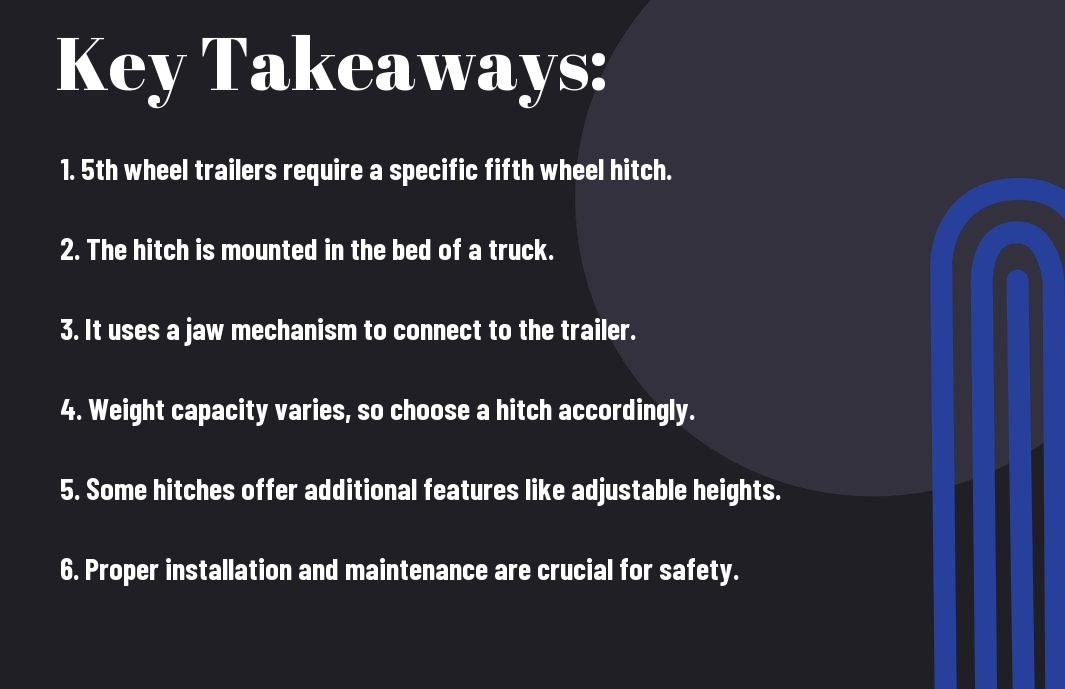Ensuring that you have the right hitch for your 5th wheel is crucial for the safety and stability of your towing experience. The type of hitch you need is determined by the weight of your RV and the towing capacity of your vehicle. Fifth wheel hitches are specifically designed to handle the unique weight distribution of 5th wheel trailers, providing a secure and stable connection between your truck and RV. It is recommended to invest in a quality 5th wheel hitch that is compatible with your RV and meets all safety standards. Failure to use the proper hitch can result in dangerous towing situations and potential damage to your vehicle and RV. It is important to consult with a professional to determine the right hitch for your specific towing setup.
Key Takeaways:
- Fifth Wheel Hitch: A fifth wheel hitch is specifically designed for towing a fifth wheel trailer and is typically installed in the bed of a pickup truck.
- Weight Capacity: It is crucial to select a hitch with a weight capacity that can accommodate the weight of the loaded trailer.
- Types of Hitches: There are different types of fifth wheel hitches including fixed, sliding, and gooseneck hitches, each with its own advantages and considerations.
- Compatibility: Ensure that the fifth wheel hitch is compatible with both the trailer and the towing vehicle, as well as ensuring the proper installation for safe towing.
- Installation: Proper installation of a fifth wheel hitch is essential for safe towing, and it is recommended that this is done by a professional or following detailed instructions.
- Maintenance: Regular maintenance and checks of the hitch, as well as the entire towing setup, are necessary to ensure safe and efficient towing.
- Safety Considerations: Understanding the specific safety considerations of using a fifth wheel hitch, including proper weight distribution and braking systems, is crucial for safe towing.

Understanding 5th Wheel Trailers
Any experienced camper knows that 5th wheel trailers are a popular choice for those who want a spacious and comfortable camping experience. Unlike traditional travel trailers, 5th wheel trailers attach to a hitch in the bed of a pickup truck, which provides increased stability and maneuverability on the road. Understanding the basic characteristics and benefits of 5th wheel trailers can help you make an informed decision when choosing the right hitch for your setup.
Basic Characteristics
5th wheel trailers are characterized by their unique hitch configuration, which allows them to attach to the pickup truck’s bed, rather than a bumper hitch. This design provides better weight distribution and stability while towing, making it easier to control and maneuver the trailer. Additionally, 5th wheel trailers typically have a raised forward section that provides additional living space, often in the form of a bedroom or storage area.
Benefits of 5th Wheel Hitches
One of the key benefits of a 5th wheel hitch is the increased stability it provides while towing. The hitch is positioned over the rear axle of the truck, which allows for better weight distribution and improves the overall towing experience. Another advantage of 5th wheel hitches is the ability to make tighter turns compared to other types of trailers, thanks to the hitch placement in the truck bed. This can be especially useful when navigating tight campsites or parking lots. Additionally, the raised design of 5th wheel trailers allows for a more spacious interior, making them a popular choice for long-term camping or full-time RV living.
Types of 5th Wheel Hitches
Your 5th wheel trailer requires a specific type of hitch in order to be towed properly. There are two main types of 5th wheel hitches to consider: fixed and sliding. Each type has its own unique features and benefits. Below, we will break down the differences between the two to help you make an informed decision about which 5th wheel hitch is right for you.
| Fixed 5th Wheel Hitches | Sliding 5th Wheel Hitches |
|---|---|
| Offers more stability and control while towing | Allows for easier maneuvering in tight spaces |
| Less potential for movement and swaying | Prevents damage to your truck and trailer during sharp turns |
| Simple and easy to use | Adjustable for various towing situations |
| More affordable option | Provides peace of mind when navigating challenging terrain |
| Best for long hauls and highway driving | Ideal for RVers who frequently camp in tight camping spots |
Fixed 5th Wheel Hitches
If you typically tow your 5th wheel trailer on long hauls and highways, a fixed 5th wheel hitch may be the best option for you. This type of hitch offers more stability and control while towing, with less potential for movement and swaying. It is also a more affordable option and is simple and easy to use. If you prioritize stability and ease of use, a fixed hitch may be the right choice for your towing needs.
Sliding 5th Wheel Hitches
If you frequently navigate tight camping spots or need to maneuver your 5th wheel trailer in challenging terrain, a sliding 5th wheel hitch could be the better option for you. This type of hitch allows for easier maneuvering in tight spaces and prevents damage to your truck and trailer during sharp turns. It is also adjustable for various towing situations and provides peace of mind when navigating difficult terrain. If maneuverability and adaptability are your top priorities, a sliding hitch might be the best fit for your towing needs.
Selecting the Proper Hitch for Your Vehicle
After determining the weight of your 5th wheel and the towing capacity of your vehicle, it’s important to select the proper hitch to ensure a safe and secure towing experience. There are a few key factors to consider when choosing the right hitch for your specific setup.
Towing Capacity and Compatibility
When selecting a hitch for your 5th wheel, it’s crucial to consider your vehicle’s towing capacity and compatibility. Exceeding your vehicle’s towing capacity can lead to dangerous situations on the road, including difficulty controlling your vehicle, decreased braking effectiveness, and potential damage to the drivetrain. Be sure to check your vehicle’s owner’s manual or consult with a professional to determine the maximum towing capacity for your specific make and model. Additionally, ensuring compatibility between your hitch and 5th wheel is essential for a safe and smooth towing experience. Proper compatibility will help minimize the risk of trailer sway and maintain stability throughout your journey.
Installation Considerations
When it comes to installing a hitch for your 5th wheel, there are a few key considerations to keep in mind. It’s crucial to ensure that the hitch is installed correctly and securely to your vehicle. Improper installation can lead to catastrophic consequences, including detachment of the trailer while in motion. Make sure to follow the manufacturer’s guidelines and specifications for installation, or seek professional help if you are not confident in your ability to install the hitch yourself. Additionally, regularly inspecting and maintaining your hitch is crucial to ensure its continued effectiveness and safety while towing your 5th wheel. Ignoring maintenance can lead to wear and tear, potentially causing hazardous situations on the road.
By carefully considering your vehicle’s towing capacity and compatibility, along with proper installation considerations, you can select the most suitable hitch for your 5th wheel and ensure a safe and secure towing experience.
Maintenance and Safety
Not only is it important to have the right type of hitch for your 5th wheel, but regular maintenance and safety checks are crucial to ensure a smooth and secure towing experience. Neglecting maintenance and safety precautions can lead to accidents and damage to your vehicle and trailer.
Regular Maintenance Checks
It is crucial to regularly check the condition of your hitch, ensuring that it is free of any wear and tear. This includes examining the hitch for any signs of rust, cracks, or bent components. The locking mechanism should also be in proper working condition, and the pins and bolts should be tightened to the manufacturer’s specifications. You should also inspect the wiring and connections for any damage or loose connections.
Safety Tips for Towing
When towing a 5th wheel, safety should be your top priority. Ensure that your trailer brakes are in good working condition, and always double-check that your safety chains are properly attached. Additionally, proper weight distribution is crucial to ensure a stable towing experience. Avoid overloading your trailer and make sure that the weight is evenly distributed. Proper tire pressure and regular tire inspections are also essential to avoid blowouts and other tire-related issues while towing. Knowing and adhering to the weight limits of your vehicle and hitch is imperative to prevent accidents and damage to your vehicle.
The Right Hitch for Your 5th Wheel
The type of hitch needed for a 5th wheel is a specific kind known as a fifth wheel hitch. This hitch is designed to carry the weight of a 5th wheel trailer and allow for smooth, stable towing. It is crucial that you choose a hitch that is compatible with both your vehicle and your trailer in order to ensure safe and efficient towing. Factors such as weight capacity, mounting systems, and hitch placement all play a role in determining the right hitch for your setup. It is important to consult with a professional to determine the best hitch for your specific needs and ensure that it is installed properly for maximum safety and performance.
FAQ
Q: What kind of hitch is needed for a 5th wheel?
A: A 5th wheel hitch is specifically designed for towing 5th wheel trailers. It is a heavy-duty hitch that mounts in the bed of a pickup truck and provides a secure connection between the truck and the trailer. This type of hitch is essential for safe and stable towing of a 5th wheel trailer.
Q: Can I use a regular trailer hitch for a 5th wheel?
A: No, a regular trailer hitch is not suitable for towing a 5th wheel trailer. 5th wheel trailers require a specific type of hitch that is designed to handle the weight and pivot point of the trailer. Attempting to use a regular trailer hitch for a 5th wheel could result in serious safety issues and damage to the vehicle or trailer.
Q: What are the different types of 5th wheel hitches?
A: There are several types of 5th wheel hitches, including fixed hitches, sliding hitches, and gooseneck hitches. Fixed hitches are permanently mounted in the truck bed and are best for standard towing situations. Sliding hitches are designed for short bed trucks and provide additional maneuverability. Gooseneck hitches are a type of 5th wheel hitch that use a ball and coupler connection and are often used in heavy-duty towing applications.
Q: Do I need any special equipment to install a 5th wheel hitch?
A: Installing a 5th wheel hitch typically requires some specialized equipment, such as a drill and mounting brackets. It’s important to follow the manufacturer’s instructions carefully and ensure that the hitch is installed securely and according to the truck’s specifications. If you’re not comfortable with this type of installation, it’s best to have a professional handle it for you.
Q: How do I know if a 5th wheel hitch is compatible with my truck and trailer?
A: The compatibility of a 5th wheel hitch with your truck and trailer is crucial for safe towing. Before purchasing a hitch, it’s important to check the weight rating and compatibility with your specific truck’s make and model. Additionally, consider the weight and dimensions of your trailer to ensure that the hitch is capable of safely handling the load. If you’re unsure, consult with a professional or the manufacturer for guidance.
